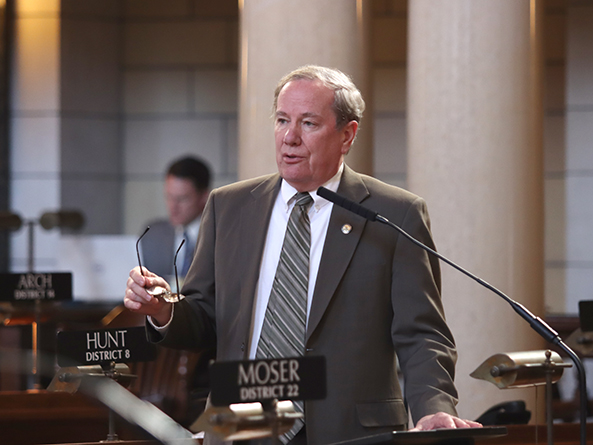Loan forgiveness for public water systems amended, advanced
A bill intended to help certain cities pay for drinking water and wastewater projects advanced to the second round of debate March 11 after lawmakers amended it to include three other measures heard by the Natural Resources Committee this session.

LB809, introduced by Sen. Mike Moser of Columbus, would authorize the state Department of Environment and Energy to use the Drinking Water Facilities Loan Fund to buy or refinance the debt obligation of any municipality for a public water supply system if the debt was incurred and construction began after July 1, 1993.
Under Moser’s proposal, the department also could enter into agreements to provide grants and loan forgiveness to certain public water systems and municipalities for drinking water and wastewater treatment projects. The agreements could cover up to 75 percent of the eligible project cost, an increase from 50 percent.
LB809 also would authorize the department to enter into similar agreements concurrent with loans to public water systems for certain lead service line replacement projects.
Moser said the changes are intended to help communities with 10,000 or fewer inhabitants finance costly drinking water and wastewater projects without raising rates on their users to “astronomically high” levels.
A committee amendment, adopted 35-0, includes the provisions of three other bills.
Under LB803, introduced by Venango Sen. Dan Hughes, grandchildren, stepgrandchildren and their spouses would be considered immediate family members for purposes of limited hunting permits issued to qualifying landowners.
The amendment also would increase the number of qualifying landowner permits to hunt deer in the three days immediately preceding the opening day of firearm deer hunting season from four to eight.
Currently, no more than two of those permits may be issued to individuals younger than 19. The amendment would increase that number to six.
The provisions of LB924, introduced by Sen. Tom Brewer of Gordon, would allow cities of the first class to apply for grants to cover the cost of deconstructing abandoned buildings.
The provisions of LB978, also introduced by Hughes, would authorize the state Department of Environment and Energy to assume authority for prohibiting or abating the discharge of dredged or fill material into waters of the U.S. under section 404 of the federal Clean Water Act.
The bill would authorize the department to administer a permitting program, collect fees, receive and initiate complaints, hold hearings and institute legal proceedings in the name of the state.
In its fiscal note for LB978, the department estimates that creating the program will require a total of $1.7 million in general funds over the next two fiscal years. The program then would cost approximately $2.6 million per year to administer.
Hughes said the program would help speed up the permitting process, saving time and money on construction projects. Permit fees paid by construction companies will fund the program once it is operational, he said.
Senators voted 35-0 to advance the bill to select file.


